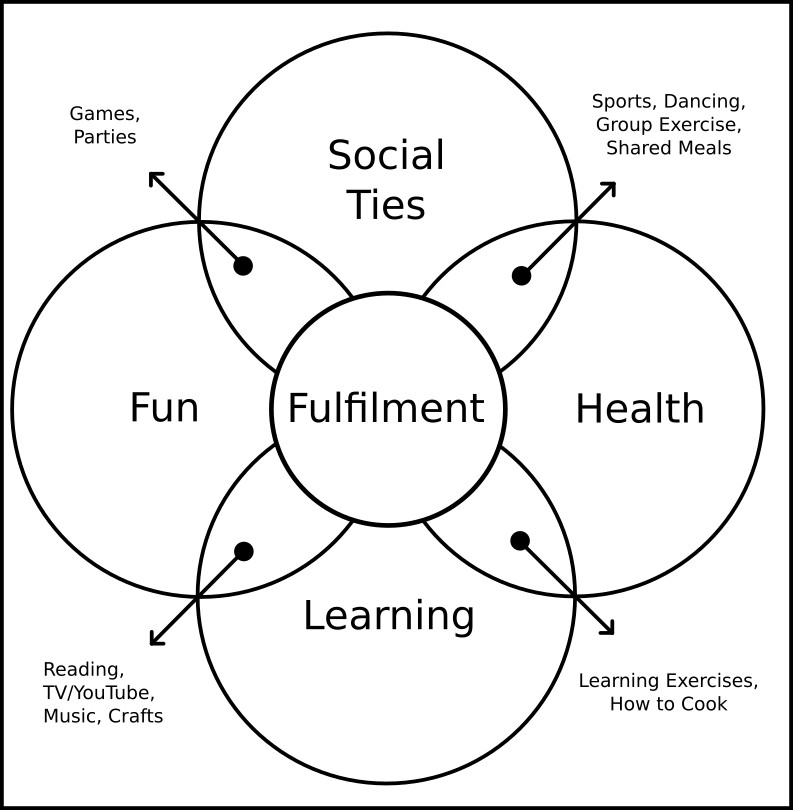Finding Effective Hobbies
After 8 hours sleeping, 8 hours working, and an hour or two cooking, eating, showering, cleaning, and so on, most people only have a few hours of personal time. So, how do you pick what to do during that time?
This is relevant to me, because I LOVE hobbies. I love learning. Focusing on just two or three things is hard. And, this framework of how to prioritize hobbies has been in the back of my head for the last few years.
A Balancing Act፨
Ikigai is a Japanese concept that has been having a moment in the western cultural zeitgeist. From what I gather, it’s a descriptor for the state of finding meaning in your life. You can experience ikigai or not.
But popularly, it’s been promoted as a framework for major life choices, especially picking a career.

At the root, the idea is a deeply pragmatic one. By balancing our various important needs, we can act in a way that builds a more meaningful life.
By identifying and accepting our human nature and world as natural constraints, it acts as a gut-check for us to ensure that our choices will be fruitful.
Because ultimately, our time here on Earth is limited and thus our choices are inherently a trade off.
This framework is most popularly applied to our careers. But I have long thought about a variation of this balancing act for my personal life.
Namely, we have limited time outside of work as well. And, we have a number of non-career needs to balance.
The Underlying Needs፨
What are the important factors to consider in our personal lives? Here’s my proposal:

- Social Ties: Activities with other people; building bonds of friendship and family
- Health: Activities that promote physical or mental health
- Learning: Activities that grow our knowledge and skills
- Fun / Relaxation: Anything that brightens your day!
Take a second to think about how you spend your personal time. How do your activities fall into these categories?
My wife also wanted me to include this choice quote from her:
Cleaning is my fun hobby.
And, that really is true. She loves cleaning. It’s like the kind of joy some people feel from organizing things. Or, that I do from cooking or watching obscene amounts of educational YouTube videos.
Either of these may sound boring for you, but they’re fun for us!
But at the same time, cleaning or endlessly scrolling YouTube are mostly hitting one category. So, they can feel unfulfilling if you spend too much time on them. Spending some time on it is good, but you need other things to balance it out.
And generally my wife and I do a fairly good job at balancing things out.
For me after work, sleep, chores, spending time with my wife, and so on, I mostly spend my personal time:
- Walking & listening to audiobooks, podcasts, youtube, etc: health and learning
- Programming: learning and fun
- Cooking: fun, mostly health, and sometimes social when cooking for family / friends
- Volunteering & helping run a church young adult group: social, fun, and learning
So, I’m fairly balanced (if I don’t accidentally spend too much time doomscrolling reddit or YouTube). Though I should really definitely find a more intense physical activity than walking.
I put some more examples of hobbies in the intersection of categories. But similar to the popular Ikigai diagram, the intersections aren’t strict either.
There are lots of hobbies that straddle other category combinations. And, that’s really the point. A more balanced set of hobbies leads to a more complete, integrated fulfillment.
Conclusion፨
Min-max’ing hobbies would take out all the fun, though. So, I’m not suggesting this as an iron rule. But our time is limited, and it’s easy to unthinkingly spend a bit too much time on a hobby that leaves some of our needs unmet.
That’s why it helps to consider high impact hobbies that hit several categories. And periodically check-in with yourself to reflect on how you’re using your time without stressing about it.
When is the last time you checked-in with yourself? Are you balanced?